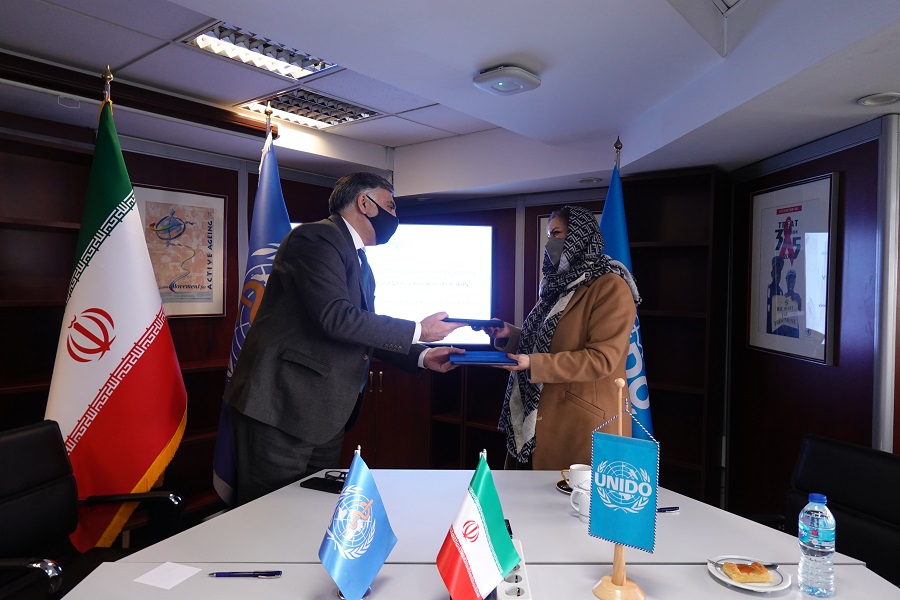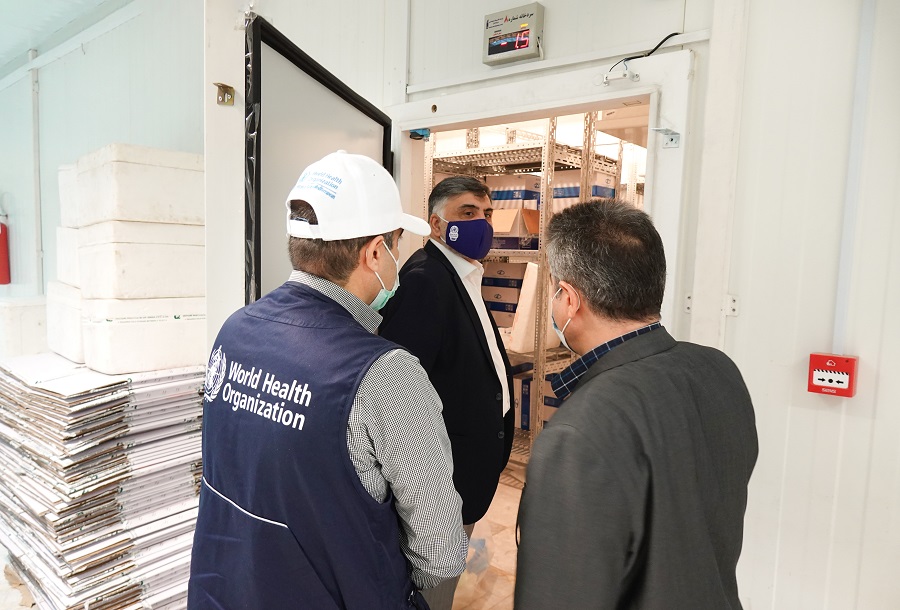
WHO Representative Dr Syed Jaffar Hussain and UNIDO Representative Ms Maryam Javan Shahraki exchange project agreements during the signing ceremony. Photo: WHO/Islamic Republic of Iran
8 December – In a new commitment to support national immunization efforts, the World Health Organization (WHO) and United Nations Industrial Development Organization (UNIDO) have signed an agreement for a partnership to strengthen the local vaccine cold chain system, with a focus on remote and underprivileged areas of the country.
The high calibre joint agreement was signed by WHO Representative and Head of Mission Dr Syed Jaffar Hussain and UNIDO Representative Ms Maryam Javan Shahraki, during an official ceremony at the WHO country office on 6 December, in the presence of authorities from the Expanded Programme on Immunization, International Relations Department of the Ministry of Health and Medical Education and United Nations Resident Coordinator in the Islamic Republic of Iran Mr Stefan Priesner.
The cooperation will lay the foundation to equip cold rooms located in the provinces of Golestan in the northeast, and Kohgiluyeh and Boyer-Ahmad in the west, with eco-friendly, resilient, and sustainable cooling systems within the framework of a project titled “Developing sustainable and resilient cold chain to facilitate access to COVID-19 tools in Islamic Republic of Iran”. It has been defined and funded to support the Ministry of Health and Medical Education in line with a global mutual agreement in place between the two UN agencies since 1989, according to which various two-way activities including on personnel, joint projects, and financing services are foreseen and committed globally.
It aims to promote the sustainable eco-friendly cold chain system and create an innovative business model through cooperation with the public or private local communities in combination with technical knowhow, as well as shared expertise of both agencies in industrial, technical, and health-related areas to effectively support the government to respond to and cope with the ongoing COVID-19 crisis.
 WHO Representative Dr Syed Jaffar Hussain pays a visit to the cold rooms in Yakhchi Abad storage facility affiliated to the Ministry of Health and Medical Education and is briefed on the cold chain system in the Islamic Republic of Iran. Photo: WHO/ Islamic Republic of Iran
WHO Representative Dr Syed Jaffar Hussain pays a visit to the cold rooms in Yakhchi Abad storage facility affiliated to the Ministry of Health and Medical Education and is briefed on the cold chain system in the Islamic Republic of Iran. Photo: WHO/ Islamic Republic of Iran
The novel coronavirus pandemic has overwhelmed economies and societies around the world, including the Islamic Republic of Iran, increasing the need for safe and effective vaccination for all as a critical measure to control the epidemic in countries, where the success of immunization efforts depends on maintaining cold chains.
The purpose of the vaccine cold chain is to maintain product quality from the time of manufacture until the point of administration by ensuring that vaccines are stored and transported within WHO-recommended temperature ranges. The vaccine cold chain is a global network of cold rooms, freezers, refrigerators, cold boxes, and carriers that keep vaccines at just the right temperature during each link on the long journey from the manufacturing line to the syringe.


